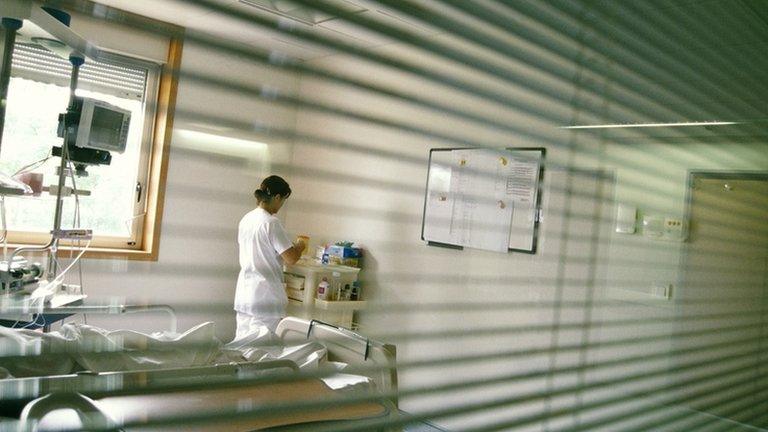Has Betsi Cadwaladr health board turned the corner?
- Published
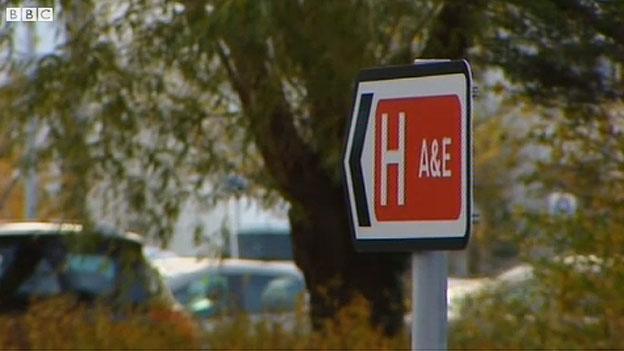
The health board looks after three general hospitals and a staff of more than 16,000
A hundred days ago, Wales' biggest health board was put into "special measures" - a move that was completely without precedent.
Never before in Wales had an entire health board been censured in this way and put under the highest possible level of Welsh government intervention and supervision.
Health Minister Mark Drakeford said the decision reflected "serious and outstanding concerns about the leadership, governance and progress" at Betsi Cadwaladr "over some time".
The board, responsible for delivering health services to almost 700,000 people in north Wales, had been rocked by a series of scandals.
The most shocking of these was a report published in May, which catalogued serious failings at the Tawel Fan mental health ward at Glan Clwyd Hospital - in the period before the unit was shut down in December 2013.
Elderly patients with dementia, the independent report concluded, had been treated like "animals".
They were left wandering around "unsupervised" often "with nothing on".
Family members expressed concerns about a lack of basic of care.
But this was not a case of a few bad apples. The report's author, Donna Ockenden, described what happened as "institutional abuse".

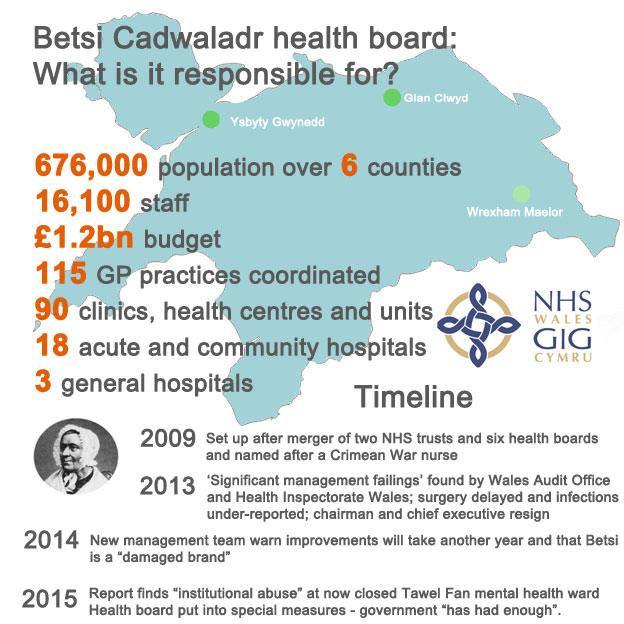

But this was one of a series of problems with Betsi Cadwaladr:
The organisation was arguably close to meltdown in June 2013 when bosses were heavily criticised by the Wales Audit Office and watchdog Health Inspectorate Wales over financial problems, mismanagement and failing to adequately tackle hospital infections.
Some senior bosses stepped down, but many other board members remained - and so did the difficulties.
As recently as February a plan was announced, with little warning, which would have seen maternity services downgraded at Glan Clwyd Hospital close temporarily. It caused an uproar.
Staffing pressures were blamed for managers wanting to move more complicated births to Bangor or Wrexham for safety reasons.
Following a legal challenge the decision was blocked by a judge and bosses later backed down and agreed to a public consultation.
Meanwhile, a leaked report in May highlighted big problems in GP out-of-hours services.
All of the problems have led some to argue, that since its inception the health board - covering six counties - was just too big to be properly managed.
What is not in doubt is that by the time it was put into special measures in June, those running it had lost the trust of much of the public in north Wales.
The first casualty of special measures was Betsi's chief executive. Within hours, it was announced that Trevor Purt had been suspended with immediate effect in what was described as a "neutral act".
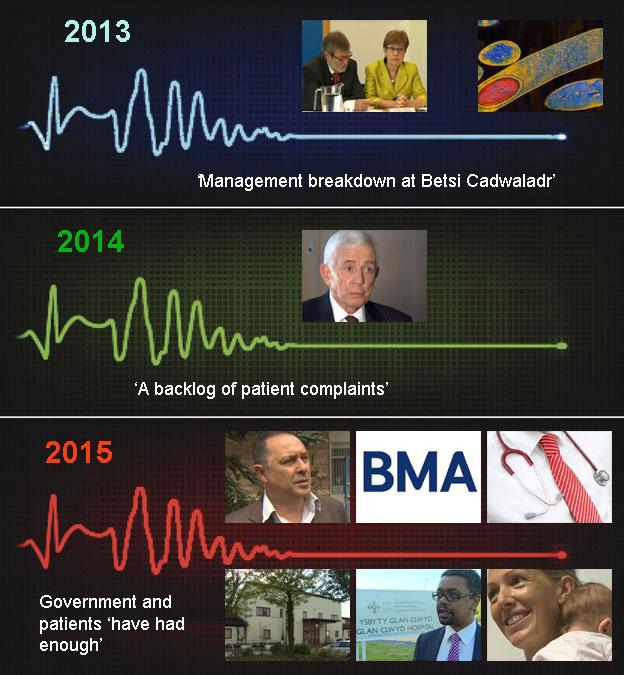
For people using the BBC news app click here, external to open interactive content on your browser.
Prof Purt, the former boss of neighbouring Hywel Dda health board, had pledged, when he took over the reigns just over a year earlier to use his "strong leadership" and wealth of experience as a senior health manager to tackle the serious challenges Betsi faced.
His successor Simon Dean, deputy chief executive of the NHS in Wales, was asked to take on what could arguably described as one of the most difficult jobs in Welsh public life.
Specifically, Mr Dean was tasked to deliver "tangible improvements" in governance and mental health services, including pushing through actions in response to the Tawel Fan report.
He was also ordered to "resolve the outstanding question" over the future of consultant-led maternity services at Glan Clwyd and to tackle concerns about GP and primary care services, including out-of-hours services across the region.
An over-arching objective was that the board should also urgently try to reconnect with the public and rebuild public confidence.
Mr Dean asked staff for 100-day plans to turn the troubled health board around.
A week ago, around 60% of the health board's "to do" list had been completed. It says it has achieved the following:
FIVE PRIORITY AREAS FOR IMPROVEMENT
Regaining the public's confidence and reconnecting with staff - 1,000 conversations with members of the public, including road shows; 40 drop-in sessions and forums with staff; web chats and a Best of Betsi blog, external; processes of raising concerns reviewed
Mental health improvement - ranging from medicines management, complaints procedure to revised training programme; reviewed job plans of medical supervisors to provide better supervision of trainees
Obstetrics and gynaecology at Glan Clwyd Hospital - six-week consultation on temporary service changes under way, 27 midwives appointed; Continued risk monitoring and management being undertaken shift by shift on current services; review of maternity services by Nursing and Midwifery Council expected shortly
Corporate governance - main capital projects now have project lead executives; the board's committee structure is being evaluated
GP out-of-hours services - work on improving performance and delivery with robust monitoring standards now in place; daily reports about shift coverage and daily unscheduled care conference calls.

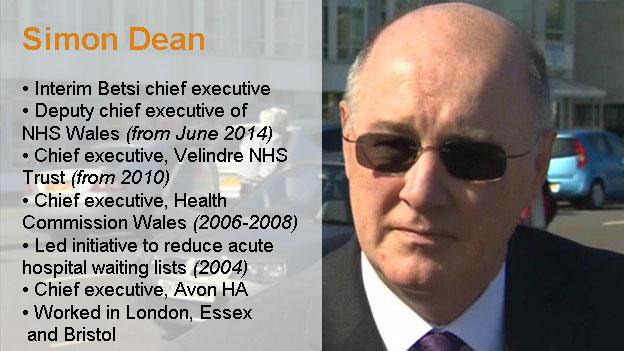

Last month, Simon Dean told me rebuilding trust and confidence was the first priority.
"We've many thousands of staff and they need to feel proud, enabled, empowered and supported as they go about their work," he said.
"In the first six weeks, we had 15 public drop-in sessions which more than 400 people attended, 10 staff drop-ins and six open forums with staff and we're working with trade unions."
He said staff morale had taken a hit and the board needed to recruit, retain and motivate.
"It's extremely difficult when people think they're all being criticised.
"We should stress that the reason the health board was put into special measures was about the organisation, not a wholesale condemnation of the health services in north Wales - it was the way in which the health board went about its business."
The Welsh government will formally review the health board's status in October.
Very few expect Betsi Cadwaladr to be taken out of special measures any time soon.
Indeed, some of its improvement plans are already timetabled to stretch until Christmas and beyond.
But in my view, the key test for the new regime will be how the public responds to the consultation underway on maternity services, external.
Some campaigners claim that the process amounts to little more than a "tick box exercise" although bosses insist it is being undertaken in good faith.
If they can convince a deeply sceptical public of that - however controversial or emotive the outcome - then that would at least be a sign that the troubled health board may have begun to turn a corner.
- Published8 June 2015
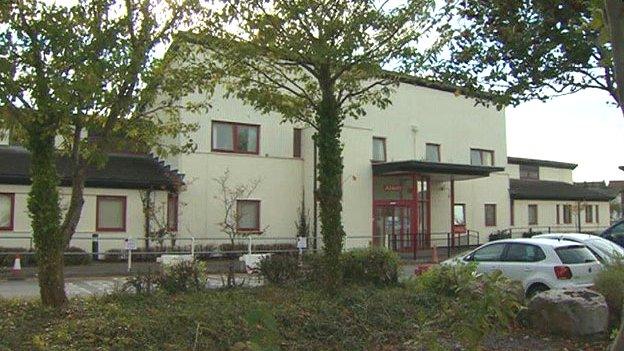
- Published8 September 2015

- Published27 June 2013
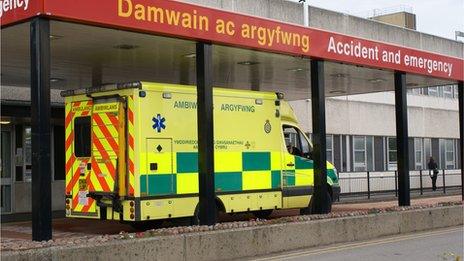
- Published27 March 2013
